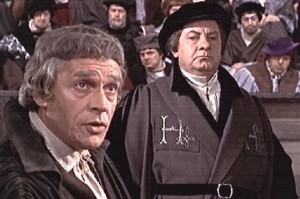Mattot 5765 — Silence Implies Consent
 Qui tacet consentit. Latin for “silence implies consent.” I don’t know where the old Romans came up with it, but it’s a principle we can derive from this week’s Torah portion, Mattot:
Qui tacet consentit. Latin for “silence implies consent.” I don’t know where the old Romans came up with it, but it’s a principle we can derive from this week’s Torah portion, Mattot:
“If a woman vows a vow to the Lord, and binds herself by an oath, being in her father’s house in her youth; And her father hears her vow, and her oath with which she has bound her soul, and her father remains silent, then all her vows shall stand, and every oath with which she has bound her soul shall stand. But if her father disallows her in the day that he hears; not one of her vows, or of her oaths with which she has bound her soul, shall stand; and the Lord shall forgive her, because her father disallowed her.”
In other words, if a young woman still living in her father’s house makes a vow, her father can overrule it, and her vow does not count. On the other hand, if the father does nothing – if he simply remains silent – the vow stands.
The Talmud has an entire tractate Nedarim, devoted to the rules of vows. In Nedarim it confirms that an unspecified silence means agreement. The medieval commentator Sforno teaches “When a person has the ability to protest and remains silent, his silence is similar to verbal consent. When you do not say something to disagree, it is as if you agree with what was said or done.”
We all know that the one of the Ten Commandments is “do not bear false witness against your neighbor.” What you might not know is that the rabbis understand this commandment as meaning you can even bear false witness by not saying a word—it does not mean the same thing as telling lies. For example, under Jewish law, you need two witnesses to be prosecuted for a crime. If there is one witness, and you stand next to that witness, making it look like you are a witness with him, when you are not, you have borne false witness—you have tried to make someone believe something that is not true with your silence, by just standing there. And you would be considered guilty of violating this commandment.
We have an example in the Torah of someone being punished for remaining silent. At the end of Parshat Baha’alotcha, there is a story about how Miriam and Aaron spoke against Moses because of “the Kushite woman,” a reference to his wife. The commentator Ibn Ezra says that Miriam spoke, and Aaron agreed or was silent – and thus he was punished. His keeping quiet while Miriam spoke against Moses was a sufficient transgression to merit his being punished.
Not only in the Torah is silence seen as consent. In civil law silence does not ALWAYS imply consent, but it can. In cases when the silent person would be bound in good faith to explain himself, silence gives consent, as long as the person knows what he is doing and his silence is voluntary. According to one law dictionary I consulted, “when any person is accused of a crime, or charged with any fact, and he does not deny it, in general, the presumption is very strong that the charge is correct.” The same reference indicated that “when an oath is administered to a witness, instead of expressly promising to keep it, he gives his assent by his silence, and kissing the book.”
Another well known example of silence meaning consent is the Presidential veto. When Congress passes a bill, if the President keeps silent, it implies he agrees with the bill and it becomes law. He has to actively protest to stop the bill from becoming law—just like the father in our example from this week’s Torah portion.
Think of all the things going on in the world around us that are wrong. They range from the profound and the unjust to things that are much more mundane.
To give a simple example many of us can relate to, a lot of parents are disturbed by the lack of “family programming” on TV. Melissa Caldwell, director of research and publications for the Parents Television Council (PTC), says “What happens is a lot of the clean shows get branded with being milquetoast or boring. It’s so much easier to insert a four-letter word or a sex joke that it almost becomes formulaic.”
So what should you do if you wish there were more shows suitable for children on TV? Caldwell says you should speak out. “A lot of people don’t like what they see,” says Caldwell, “but don’t voice their protest. Silence tends to give consent.”
Silence tends to give consent. But not only to the relatively banal, like TV programming. Silence tends to give consent for crimes for more heinous than four letter words on TV.
In 1939 the population in Germany was 79 million people. If half of them had taken to the streets in protest, would Hitler have been able to conduct his genocide against the Jews? Isn’t it the silence of 78 million plus of those 79 million people that gave Hitler the tacit consent to his wicked plan?
Edmund Burke said “All that is necessary for the triumph of evil is that good men do nothing.” That they keep silent.
Now to be fair, the truth is that silence does NOT always mean consent. Silence is actually quite a complicated affair. Nowhere is this better proven than in a brilliant scene from the movie “A Man For All Seasons,” which Steven Spielberg and I will act out for you.
A Man For All Seasons is the story of Sir Thomas More, who had the temerity to stand up to King Henry VIII when Henry decided to divorce his wife against the wishes of the Catholic church. He established the Church of England, the Episcopalian or Anglican Church, instead. More had been Lord Chancellor, number two man to the King. He resigned as the schism with the Catholic church was approaching. A little while later, he refused to take an oath required of all citizens of England repudiating the influence of “foreign powers,” meaning the Pope, in English affairs. More maintained that he was not renouncing the king—he was simply maintaining his silence, and silence implies consent, so the King should leave him alone.
The following is the way the movie treats a historical meeting between More (played by Steven Spielberg) and King Henry’s chief advisor, Thomas Cromwell (played by myself):
Cromwell: Now, Sir Thomas, you stand on your silence.
Sir Thomas More: I do.
Cromwell: But, gentlemen of the jury, there are many kinds of silence. Consider first the silence of a man who is dead. Let us suppose we go into the room where he is laid out, and we listen: what do we hear? Silence. What does it betoken, this silence? Nothing; this is silence pure and simple. But let us take another case. Suppose I were to take a dagger from my sleeve and make to kill the prisoner with it; and my lordships there, instead of crying out for me to stop, maintained their silence. That would betoken! It would betoken a willingness that I should do it, and under the law, they will be guilty with me. So silence can, according to the circumstances, speak! Let us consider now the circumstances of the prisoner’s silence. The oath was put to loyal subjects up and down the country, and they all declared His Grace’s title to be just and good. But when it came to the prisoner, he refused! He calls this silence. Yet is there a man in this court – is there a man in this country! – who does not know Sir Thomas More’s opinion of this title? Crowd in court gallery: No!
Cromwell: Yet how can this be? Because this silence betokened, nay, this silence was, not silence at all, but most eloquent denial!
Sir Thomas More: Not so. Not so, Master Secretary. The maxim is “Qui tacet consentiret”: the maxim of the law is “Silence gives consent”. If therefore you wish to construe what my silence betokened, you must construe that I consented, not that I denied.
Cromwell: Is that in fact what the world construes from it? Do you pretend that is what you wish the world to construe from it?
Sir Thomas More: The world must construe according to its wits; this court must construe according to the law.
If we are silent in the face of great wrongs, how is it to be construed? At its worst, it could be construed as consent. At its best it could be construed as apathy: a lack of care and concern.
We live in a world where there are many issues that beg for speaking up. Murder on a massive scale in Darfur, Sudan. Terrorism. Torturing prisoners. Slavery. Bias against Israel everywhere you turn, most recently from the Vatican where terrorists in Israel were not condemned while terrorists in London and Madrid were. 45 million people without health care in the United States. 10 million people a year dying from starvation around the world.
We must speak out, on these and other important issues.
There is a famous poem, attributed to Martin Niemoller:
“First they came for the communists, and I did not speak out – because I was not a communist;
Then they came for the socialists, and I did not speak out – because I was not a socialist;
Then they came for the trade unionists, and I did not speak out – because I was not a trade unionist;
Then they came for the Jews, and I did not speak out – because I was not a Jew;
Then they came for me – and there was no one left to speak out for me.”
If you want someone to speak out for you, you must speak out on behalf of others. If you are silent, you are making a statement: and Craig Bruce said “Silence is a statement that is open to gross misinterpretation.”
Do not allow your silence to be grossly misinterpreted. I know you are all good people, who do NOT consent to the terrible things going on in the world. Don’t let your silence be misconstrued. Speak out. Pick a subject you believe is important and learn about it. Talk to other people about it. Write letters to the editor about it.
Lest someone think that your silence gives consent.
May God bless us all with the strength and determination to speak out about injustice, whether injustice here at home or injustice across the ocean, whether the injustice of Jews or the injustice of Gentiles,
Amen.

